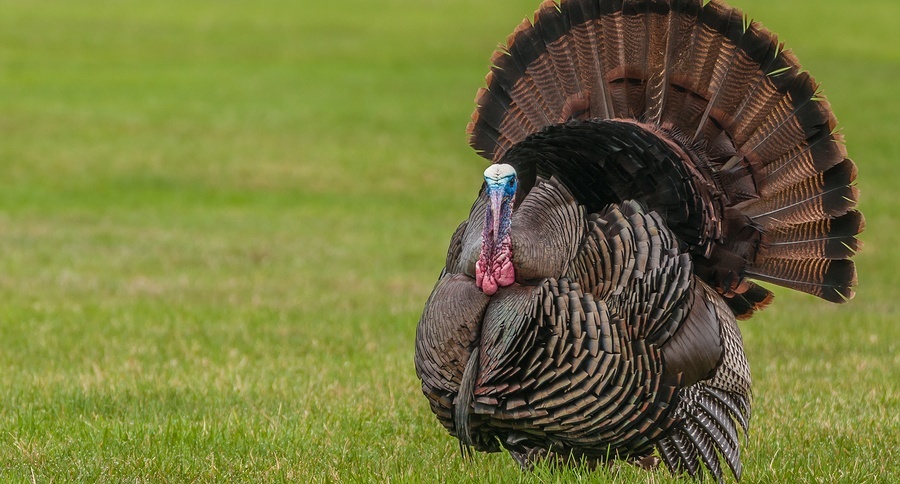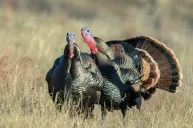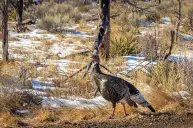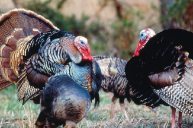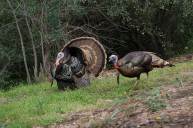To many hunters, the act of calling in and killing a wild turkey is filled with mystery.
Like anything mysterious, myths abound. It's important for turkey hunters out there to know which of those myths are legitimate and which are nonsense.
Here are 10 of the most common inaccurate myths to keep in mind this turkey season.
Have you ever heard any of these?
1. You have to be an expert caller to kill a turkey.
Calling is an important part of the turkey hunting game, but you don't need to be a turkey call expert to make it work. Real hens have different voices and, like humans, they sometimes make mistakes when talking to one another.
The trick is to limit your mistakes through practice. Beginners should start with a slate or box call and leave the diaphragms to the experts. Only call enough to keep that gobbler coming. Sometimes it only takes one or two calls to kill a bird.
2. You can't call in a gobbler with hens.
If there are other toms gobbling in the area, go to them, but if the henned up gobbler is the only game in town, here's how to kill him.
First, call to the hens. If you can get the boss hen fired up, she might come in looking for a fight, dragging her lovesick longbeard behind her.
If that doesn't work, scatter the flock. This works best if you do it after the birds have roosted in the evening. Watch which way the turkeys go and try to get between the hens and the gobbler.
After spending the night alone, he'll come running to your calls the next morning.
3. You need a cannon to kill a turkey.
Turkeys are tough, no doubt, but you don't need a 12-gauge loaded with 3-1/2-inch mags to kill one. Plenty of turkeys have fallen to 20-gauge and even .410 shotguns. The secret is to pattern the gun before the season and limit yourself to the effective range of your gun-load combination.
4. You can't bowhunt a turkey without a blind.
If hunting turkeys from a stationary position inside a tent doesn't appeal to you, it is still possible to bowhunt a turkey. Leafy camo or ghillie suits will help break up your outline and decoys placed well inside your effective range will draw the bird's attention. Time your draw correctly and arrow that big tom.
5. Spook a turkey once and you're done.
Many hunters believe that if you call a turkey in and spook it, you'll never call it in again. This is not true. Give the turkey time to settle down and switch calls and calling positions to bring the bird back. The breeding season is short and gobblers won't let a little scare slow them down for long. It might take a few hours or a few days, but, if you are persistent, he will come in again.
6. You can't call a turkey downhill.
Turkeys will go in any direction to reach other turkeys. A setup downhill from the bird you are hunting is not ideal because it gives him a commanding view of the area (and you) as he approaches. However, sometimes your hand is forced in the turkey woods. Given the option, I like to get on the same level as the turkey, but it is entirely possible to call a bird downhill.
7. Mild winters move up the breeding schedule.
Gobblers will get fired up and start gobbling earlier on the tail of a mild winter, but it takes two to tango. Hens start breeding based on the amount of daylight. Breeding will take place with little variation from year to year.
8. Turkeys only gobble in the spring.
Gobblers earned their name for a reason—they gobble. In the spring, they gobble to attract hens and claim their turf. Outside of the mating season, gobbling is a sign of dominance and it's common to hear fall birds gobbling.
9. Only gobblers have beards.
Roughly 10-20 percent of hens grow beards. A hen's beard is typically shorter and skinnier than that of a gobbler and she can be distinguished by her grayish blue head. Bearded hens are legal game in most spring seasons, so the option is yours on whether or not to pull the trigger.
10. Turkeys get call-shy.
Hens begin calling to their poults before they hatch. After that, wild turkeys call to each other every day of their lives. A "call-shy" turkey is more likely an educated turkey. Change up your calls and calling style to limit the chances of birds learning your schtick. Public land birds are typically quieter than their private land cousins, so vary your calling accordingly.
Don't buy into these turkey hunting myths and see more success in the turkey woods this spring.
Gobble away, my hunting friends!
NEXT: MDC PREDICTS A DOWN YEAR FOR SPRING TURKEY HUNTING
WATCH
